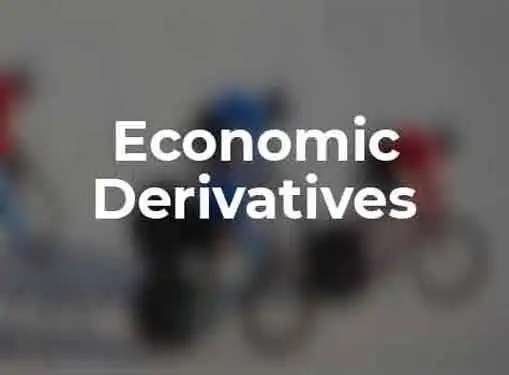Understanding Derivatives
Economic Derivatives
Written by Bennet Grill for Gaebler Ventures
Sophisticated entrepreneurs hedge business risk by using financial instruments called derivatives. We take a look at how economic derivatives can protect entrepreneurs from drastic changes in a country's economic climate.
Economic derivatives, also known as macro derivatives, are financial instruments which essentially allow investors to place bets on the future performance of the economy as a whole.

Instead of investing in the performance of one fund or company, economic derivatives allow investors to gain risk exposure to metrics such as a country's gross domestic product (GDP) or consumer price index (CPI).
Economic derivatives were first issued through a joint venture between Goldman Sachs and Deutsche Bank in 2002. Neither of these banks currently offers economic derivatives-- they can be found on the Chicago Mercantile Exchange.
Economic derivatives most often take the form of a binary option. Like the name implies, a binary option contract can have one of two results--if the underlying metric hits within the strike range, the investor gets paid the contracted premium. If the metric falls outside the strike range, the investor is paid nothing.
The mechanisms of a macro derivative are relatively simple--an investor will purchase a binary option contract in exchange for a guarantee of a payout on a specific date (the exercise date) if the underlying metric (be it GDP, CPI, or inflation) is within the strike range.
In a simplified example, let's say an investor purchases 100 option contracts for 10 cents a piece which guarantee him a payout of one dollar if GDP increases by 2%. If GDP increases by that amount, the investor is paid 100 x $1 = $100. He profits $90 because he has already paid $10 to purchase the option contracts. If the GDP does not increase by 2%, the investor is paid nothing and is left with a net loss of $10.
Prices for economic derivative contracts are determined through an auction system where individual buyers are matched with sellers. There are a number of economic metrics which can serve as the underlying information for economic derivatives. These metrics include:
- U.S. Non-Farm Payroll
- The Institute of Supply Management's (ISM) PMI Index
- U.S. Initial Jobless Claims
- Retail Sales
- Eurozone Harmonized Index of Consumer
- Prices (HICP) Ex-Tobacco
- U.S. International Trade Balance
- U.S. Gross Domestic Product (GDP)
To learn more about economic derivatives on the Chicago Mercantile Exchange, visit the following website:
www.cme.com/trading/prd/econ/index.html
Bennet Grill is a writer who has a passion for business and finance. He is currently an Economics major at Duke University in North Carolina.
Share this article
Additional Resources for Entrepreneurs

Conversation Board
We welcome your comments on economic derivatives.